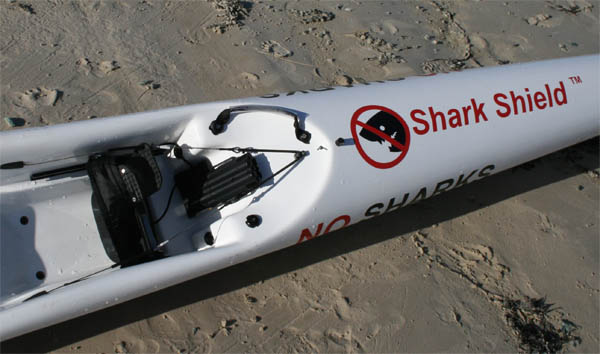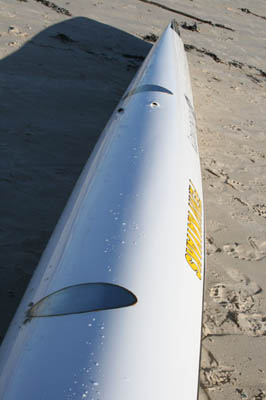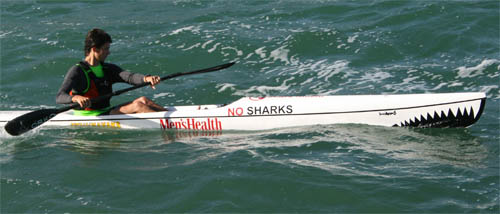Shark-shielded Surf Ski
Since 2002, three surf skis have been bitten and severely damaged by Great White Sharks in False Bay, here in Cape Town, South Africa (See Sharks and Skis). After each incident there has been vigorous debate about how to prevent such interactions between the sharks (who are after all just living in their own environment) and humans.

Shark Shield - Impractical for Surf Skis?
One device invented in South Africa and developed in Australia is the Shark Shield - which has been used successfully by water users including surfers, divers and commercial fishermen to keep sharks at a comfortable distance. It operates by generating an electric field in the water that sharks find uncomfortable - an effective, non invasive, ecologically friendly solution.
But, until now, the Shark Shield hasn't been very practical for surf ski paddlers - because the unit relies on having a long antenna immersed in the water. That's not good when your craft is designed to have the minimum possible drag through the water. (I actually bought a Shark Shield in 2005 after Trevor Wright's ski was "nibbled" by a big Great White off Sunny Cove in Fish Hoek but I didn't even try to fit to my ski - on seeing the length of antenna that I'd have to drag around I immediately re-sold the device.)
Enter Mike Schilperoort
For the last two years, Mike Schilperoort, chairman of the Fish Hoek Surf Lifesaving Club has been working with Shark Repellent Technologies, a division of the Natal Sharks Board, on this very problem: how to fit the Shark Shield on a surf ski in such a way as to minimize its impact on the performance of the ski.
The result is a special model of the Fenn Mako6 ski adapted to fit stainless steel oval plates, recessed into the underside of the hull in such a way as to minimize drag. The Shark Shield's battery pack is fitted into an existing recess in front of the rudder pedals, allowing easy access for the paddler - both to detach the battery pack for recharging and to switch it on and off when required.

Tests by the Natal Sharks Board have shown that the Shark Shield is effective for up to six metres from the electrodes.
Fenn Mako6 "Shark Shield Special"
The ski will be a standard Mako6 made in a special mould that includes the electrode recesses (there's only one prototype at the moment and Mike is looking to put together an initial order of about five skis to make it worthwhile to build a mould). The all up weight of the ski (including the Shark Shield) will be about 1kg heavier than normal.
Dawid Mocke, #2 world ranked ski paddler, runs his Surfski School from Fish Hoek beach and is most enthusiastic about the Shark Shield ski. For a couple of years now he's been using shark shields attached to a line of buoys off the beach to protect his novice paddlers.
"It's a great idea," he said, "and as for the weight - well, a slightly heavier ski is not a bad thing for training and you're going to be a lot more comfortable knowing that you're safe!"
Using the Shark Shield Ski
The device's electric field is strong enough to be uncomfortable when you're in the water near the electrodes so the standard procedure is to pull the ski on its side to get the electrodes out of the water, switch the unit off, get back into the ski and switch it on again.
"The only other time you might feel a twinge is if you wallow in the water and a wave washes over you, say if you fall off the back of a wave," said Pete Cole of the Fish Hoek Surf Lifesaving Club. "Otherwise there's no drawback to its use at all."

How to get a "Shark Shield Special"
Contact Mike Schilperoort on +27 82 770 8604 or This email address is being protected from spambots. You need JavaScript enabled to view it.
For more information on the Shark Shield, go to www.sharkshield.com

